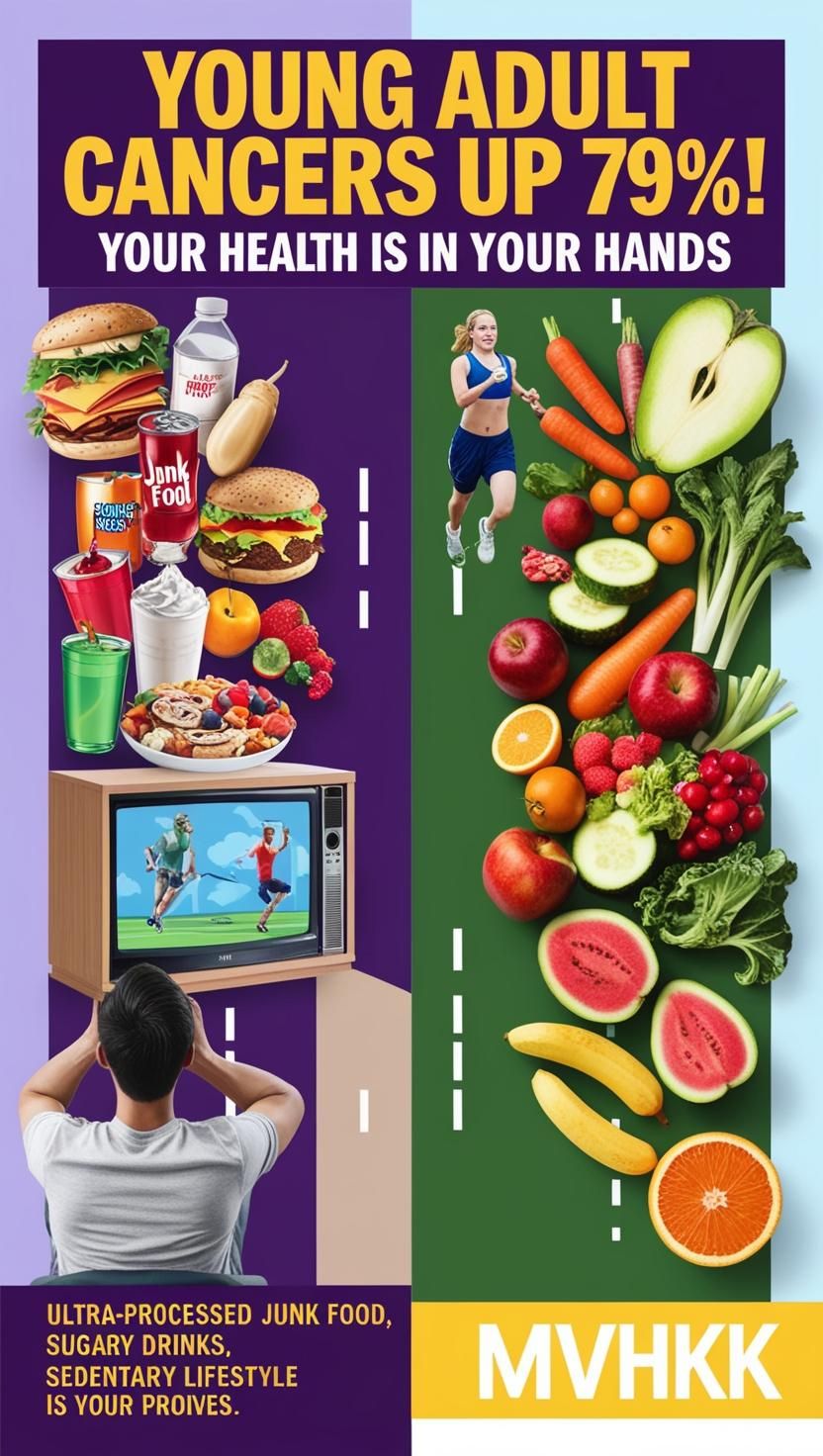Young Adult Cancers Up 79%! Here’s Why & How to Protect Yourself
🚨 The Startling Rise of Cancer in Young Adults
Cancer rates among young adults have surged by 79% in the last decade. This alarming trend raises a crucial question: Why is this happening? While genetic mutations play a role in cancer development, our genes haven’t changed overnight – but our lifestyles have.
Factors like processed foods, excessive sugar intake, sedentary lifestyles, and environmental toxins are accelerating disease risk. The good news? You can take proactive steps to protect yourself. Here’s what you need to know.
1️⃣ What’s Causing the Spike in Cancer Among Young Adults?
🍔 Highly Processed Foods and Additives
The modern diet is packed with ultra-processed foods loaded with preservatives, artificial colors, and refined sugars. Studies suggest these foods increase inflammation and oxidative stress, both of which contribute to cancer development.
Scientific Evidence:
- A study published in The BMJ found that a 10% increase in processed food consumption led to a 12% higher risk of cancer.
- Nitrates and nitrites (commonly found in processed meats) have been classified as carcinogenic by the World Health Organization (WHO).
🍭 Excess Sugar and Insulin Resistance
High sugar consumption spikes insulin levels, creating an environment where cancer cells thrive. Sugar not only fuels tumor growth but also promotes chronic inflammation, a known driver of cancer.
Scientific Evidence:
- A JAMA Internal Medicine study linked high glycemic index diets to an increased risk of multiple cancers, including colorectal and breast cancer.
- Research from MD Anderson Cancer Center showed that high sugar intake increased breast cancer metastasis in animal studies.
🛋️ Sedentary Lifestyle and Lack of Movement
Sitting for prolonged periods raises cancer risk by promoting weight gain, reducing insulin sensitivity, and slowing metabolism.
Scientific Evidence:
- A Journal of the National Cancer Institute meta-analysis linked prolonged sitting to higher risks of colon, endometrial, and lung cancer.
- Exercise is a natural cancer fighter, reducing inflammation and boosting immune function.
2️⃣ How to Lower Your Cancer Risk Naturally
🥗 Prioritize Whole, Nutrient-Dense Foods
A diet rich in whole, unprocessed foods can help combat inflammation and oxidative stress.
Best Cancer-Fighting Foods:
- Cruciferous Vegetables (Broccoli, Brussels sprouts, Kale) – Contain sulforaphane, a potent anti-cancer compound.
- Berries (Blueberries, Strawberries) – High in antioxidants and polyphenols.
- Turmeric – Contains curcumin, known for its powerful anti-inflammatory effects.
- Fatty Fish (Salmon, Sardines) – High in omega-3 fatty acids, which reduce inflammation.
- Green Tea – Packed with catechins, which may help prevent cancer cell growth.
🏃 Stay Active & Avoid Prolonged Sitting
Regular physical activity improves immune function and reduces hormonal imbalances that contribute to cancer.
✅ Aim for 150 minutes of moderate exercise per week (such as brisk walking, cycling, or swimming). ✅ Break up long periods of sitting by standing up every 30 minutes.
🌱 Reduce Environmental Toxins
Everyday exposure to toxins in plastics, household cleaners, and personal care products can accumulate in the body and disrupt hormones.
✅ Use glass or stainless steel containers instead of plastic. ✅ Choose organic produce to reduce pesticide exposure. ✅ Opt for natural personal care products free from parabens and phthalates.
3️⃣ Building a Cancer-Resistant Lifestyle
😴 Prioritize Restorative Sleep
Lack of sleep weakens the immune system and increases chronic inflammation.
- Stick to a consistent sleep schedule.
- Reduce blue light exposure from screens before bedtime.
- Create a dark, cool sleep environment to improve quality.
☀️ Manage Stress Effectively
Chronic stress triggers hormonal imbalances that weaken immune defenses.
- Practice mindfulness, yoga, or deep breathing techniques.
- Spend time outdoors and engage in hobbies.
- Limit exposure to negative news and social media.
🚰 Stay Hydrated & Detoxify Naturally
- Drink at least 8 cups of filtered water per day.
- Incorporate detoxifying foods like lemon water, cilantro, and chlorella.
- Reduce alcohol consumption, as alcohol is a known carcinogen.
🔥 Take Action Today
The 79% rise in young adult cancers is a wake-up call. But by making small, consistent lifestyle changes, you can significantly reduce your cancer risk. Start by: ✅ Eating more whole, nutrient-rich foods ✅ Moving your body every day ✅ Reducing exposure to harmful chemicals ✅ Prioritizing sleep and stress management
Your future health starts today! 💪
📌 Frequently Asked Questions (FAQ)
❓ What type of cancer is increasing in young adults?
Cancers like colorectal, breast, thyroid, and melanoma have seen the most significant increases in young adults.
❓ Can diet alone prevent cancer?
While diet is crucial, a holistic approach including exercise, stress management, and reducing toxin exposure provides the best protection.
❓ Does exercise really lower cancer risk?
Yes! Exercise helps regulate hormones, boost immunity, and reduce inflammation, all of which lower cancer risk.
- Study on processed foods and cancer risk (The BMJ)
- WHO Classification of Carcinogens
- Exercise and cancer prevention (National Cancer Institute)






